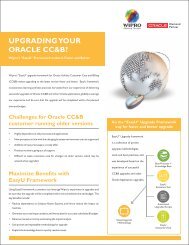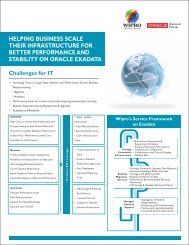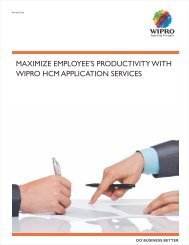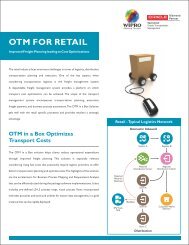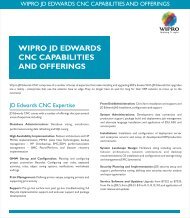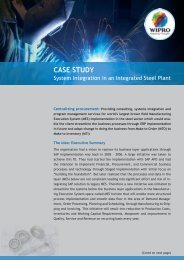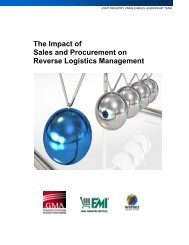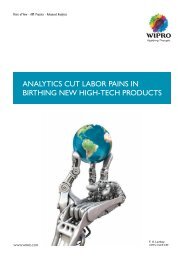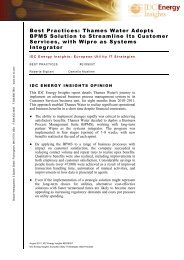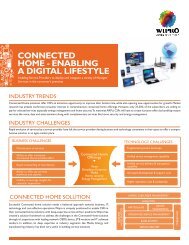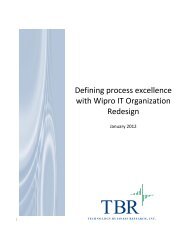Green Evolution: Managing the Risks, Reaping the Benefits - Wipro
Green Evolution: Managing the Risks, Reaping the Benefits - Wipro
Green Evolution: Managing the Risks, Reaping the Benefits - Wipro
Create successful ePaper yourself
Turn your PDF publications into a flip-book with our unique Google optimized e-Paper software.
20<br />
energy needs from <strong>the</strong>se new systems,” Kleindorfer<br />
says. “And <strong>the</strong>y’re eliminating imported fossil fuels<br />
in favor of sourcing biomass and geo<strong>the</strong>rmal within<br />
30 miles of <strong>the</strong> plant.”<br />
By striving for carbon neutrality, Pfizer’s Freiburg<br />
operation would set itself up for profiting by selling<br />
<strong>the</strong> carbon certificates that are <strong>the</strong> currency of<br />
European cap-and-trade systems, according to<br />
Kleindorfer. “Pfizer’s approach is particularly good,<br />
but <strong>the</strong>re are literally thousands of projects like<br />
this all over Europe. It’s not inconsequential for<br />
a company to save 20% to 30% on energy costs,<br />
and it’s even more important for energy-intensive<br />
industries such a cement, steel and aluminum.”<br />
Some of <strong>the</strong> most effective energy-efficiency<br />
projects are business-to-business partnerships.<br />
For instance, <strong>the</strong> Commonwealth Edison utility<br />
teamed with <strong>the</strong> Ford Motor Company to save<br />
more than a million kilowatt-hours of electricity<br />
(worth almost $100,000 annually) at a two million<br />
square-foot stamping plant in Chicago Heights, Ill.<br />
The project included upgrading more than 1,000<br />
lighting fixtures and installing ano<strong>the</strong>r 1,000<br />
occupancy sensors. Gloria Georger, <strong>the</strong> Ford plant’s<br />
manager, told Commonwealth Edison that <strong>the</strong><br />
benefits extended beyond saving electricity. “The<br />
improvements to our lighting provided a better<br />
working environment for our employees,” she says.<br />
“As a result, we see an increase in productivity.”<br />
In developing countries where energy is expensive,<br />
companies seeking a competitive advantage have<br />
already picked much of <strong>the</strong> low-hanging fruit, says<br />
Ulku G. Oktem, a chemical engineer and Wharton<br />
adjunct professor of operations and information<br />
management. Currently teaching at Bahcesehir<br />
University in Istanbul, Turkey, as well as at Wharton,<br />
Oktem cites <strong>the</strong> examples of Turkish escalators, which<br />
incorporate motion sensors to operate only when<br />
people approach <strong>the</strong>m, and classrooms with lights<br />
that automatically cycle off. “It is far more common<br />
to see things like that <strong>the</strong>re,” she says. “People seem<br />
to be conscious of saving energy.” Because of this<br />
experience, she believes that western companies<br />
operating in <strong>the</strong> third world need to involve local<br />
people in <strong>the</strong>ir energy-efficiency improvement<br />
programs. “Ra<strong>the</strong>r than being imposed top down,”<br />
she says, “<strong>the</strong> programs need to incorporate local<br />
knowledge, customs and behaviors.”<br />
Oktem also points out that “a lot of low-hanging<br />
fruit in product design and development,” citing<br />
both Xerox and Mattel as companies that have<br />
IGEL | Knowledge@Wharton Special Report<br />
improved environmental performance with leadingedge<br />
product design and o<strong>the</strong>r innovations.<br />
According to Mattel’s 2009 Global Citizenship Report,<br />
installation of an evaporative air cooler on a paint<br />
line saved 130,000 kilowatt-hours of electricity.<br />
Replacing hydraulic injection molding with electric<br />
molding saved $100,000 in annual energy costs.<br />
Improvements in <strong>the</strong> U.S. distribution system reduced<br />
electricity use 30% by, among o<strong>the</strong>r things, using<br />
skylights instead of artificial light in warehouses and<br />
reducing <strong>the</strong> use of supplemental lighting.<br />
Close to Home: Saving Energy at <strong>the</strong><br />
University of Pennsylvania<br />
Emily Schiller, a 2009 MBA graduate of Wharton,<br />
is associate director of sustainable initiatives<br />
at Wharton. The school’s recent environmental<br />
innovations include, in 2004, <strong>the</strong> launching of a<br />
three-bin recycling program (expanded in 2008),<br />
which has increased <strong>the</strong> school’s overall recycling<br />
rate from 18% to 25%, and default two-sided (known<br />
as duplex) printing, which saves 2.4 million sheets<br />
of paper a year.<br />
Schiller says her Wharton energy-efficiency work has<br />
focused on four categories: HVAC, lighting, green<br />
IT and behavioral changes. At Wharton’s Jon M.<br />
Huntsman Hall, for instance, Schiller’s team found<br />
that <strong>the</strong> set points for <strong>the</strong> HVAC system brought in<br />
more outside air than was necessary for good air<br />
quality. The HVAC project is currently under review<br />
and may be able to provide savings of $200,000 a<br />
year, Schiller says.<br />
“Lighting is also huge,” Schiller adds. “There are<br />
thousands of light bulbs just in Huntsman Hall,<br />
and we’re changed <strong>the</strong>m all to high-efficiency<br />
fluorescents and LEDs.” More than 500 public<br />
computers at Wharton now go to “sleep”after an<br />
hour of sitting idle, saving $8,000 a year.<br />
And a search is on at Wharton for “vampire” or<br />
“phantom” loads — devices from coffeemakers and<br />
microwaves to “sleeping” computers — that use<br />
significant amounts of “standby” electricity even<br />
when not in use. This secret power use accounts<br />
for 6% of electricity consumption nationally, and<br />
Schiller says that one way to reduce this power<br />
drain would be to unplug <strong>the</strong>se appliances at <strong>the</strong><br />
end of <strong>the</strong> workday, over <strong>the</strong> weekend and on<br />
holidays. “Anything with an LED light uses power,<br />
and in my office I’ve agreed to reset all <strong>the</strong> clocks,”<br />
Schiller says.




